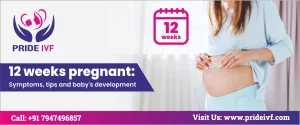After a miscarriage, the journey of getting pregnant can be both hopeful and disturbing. For people and couples trying to conceive, having a miscarriage can be an extremely difficult and emotional journey. Miscarriages can be emotionally devastating experiences. It’s a time of grief, uncertainty, and a wide range of complicated feelings. On the other hand, a lot of people discover resiliency and hope in their quest for a pregnancy after miscarriage.
Always remember that you are not alone if you are walking this path. After a miscarriage, many women go on to successfully conceive and carry their pregnancies to term. This blog seeks to give you useful advice and insights on how to maximize your chances of becoming pregnant again following a miscarriage. The goal of this blog is to offer thorough advice and useful hints to improve your chances of getting pregnant again after a miscarriage and keeping it healthy.




Understanding Pregnancy after Miscarriage
About 10–20% of pregnancies end in miscarriage, which is defined as the loss of a pregnancy before the 20th week. It’s a devastating event that can cause mental damage and push concerns regarding getting pregnant again in the future. Nonetheless, a large number of women who have miscarried go on to become pregnant and give birth to healthy children.
Each person experiences a distinct and profound emotional toll from miscarriage. Feeling a range of emotions is normal, ranging from deep loss and anger to sadness and guilt. The process of emotionally healing is a necessary first step in getting ready for a second pregnancy. Considering professional counseling, asking loved ones for support, and granting yourself permission to grieve can all help you get through this difficult period.
Also Read: गर्भपात के लक्षण: Top 4 Miscarriage Symptoms
When you set out on this path to becoming pregnant following a miscarriage, keep in mind that hope is a strong emotion. The possibility of having a healthy baby is a ray of hope, even though the road may be difficult. Have faith in your body’s ability to bounce back, ask for help when you need it, and take each step forward with bravery and resolve.
We’ll look at useful advice and strategies in this blog exclusively created by the expert team of Pride IVF to help you become more fertile, aid in conception, and support a healthy pregnancy after miscarriage. Each tip is intended to provide you with knowledge and techniques to help you navigate this life-changing experience with resiliency and hope. Together, let’s set out on this adventure, embracing the prospect of fresh starts and the promise of tomorrow for pregnancy after miscarriage.
-
Allow Time for Emotional Healing
Each experiences miscarriage in a different way emotionally. Before attempting to become pregnant again, it is imperative that you give yourself time to mourn and work through your feelings. If you need it, get help from friends, family, a therapist, or support groups. The first step in getting ready for a new pregnancy journey is emotional healing.
-
Recognize the Process of Physical Recovery
After a miscarriage, your body requires time to heal physically. Although recovery times vary, it’s generally advised to wait until after at least one menstrual cycle before attempting to become pregnant once more. This guarantees that your menstrual cycle has returned to normal and permits your body to heal.
-
Keep an Eye on Your Menstrual Cycle
You can figure out your fertile window—the days when you are most likely to conceive—by monitoring your menstrual cycle. To determine when ovulation is occurring, use ovulation predictor kits or track variations in basal body temperature and cervical mucus. With this information, you can maximize the time you get pregnant. Also Read: How Long Does it take to get pregnant when actively trying.
-
Emphasize a Healthy Lifestyle and Nutrition
Overall health and fertility are supported by eating a balanced diet high in fruits, vegetables, lean proteins, and whole grains. Think about including foods high in antioxidants, nuts, seeds, and leafy greens—foods that increase fertility. Steer clear of excessive alcohol consumption, caffeine use, and smoking as these can all harm fertility.
-
Control Your Anxiety and Stress
It’s important to find healthy ways to manage stress because it can negatively impact fertility. Engage in relaxing activities like yoga, mindfulness, meditation, and deep breathing. To lower stress levels, prioritize self-care, spend time outside, and partake in enjoyable activities.
-
Take Preconception Exams Into Consider
Make an appointment for a preconception checkup with your healthcare provider before attempting to conceive again. They can assess your general health, go over any medical records pertaining to the miscarriage, and offer advice on how to get the best possible health for pregnancy. Your chances of having a healthy pregnancy can increased by taking care of any underlying medical issues.
-
Recognize Your Window of Fertility
Even though it’s normal to want to get pregnant right away after losing a pregnancy, keep in mind that fertility varies from cycle to cycle. Conception takes time, usually, even in the best of circumstances. Have patience with your body and yourself, and believe that each menstrual cycle will increase your chances of becoming pregnant.
-
Reach Out to Your Partner
During this period, you and your partner must be in constant communication. Express your thoughts, emotions, and aspirations for the future. Talk about your plans to try to get pregnant again together, and support one another emotionally as you go. Your journey towards parenthood can be positively impacted by fortifying your emotional and mental connect with your partner.
-
Understand About Recurrent Miscarriages to Yourself
See a reproductive specialist if you’ve had recurrent miscarriages, which are defined as multiple miscarriages. They can perform tests to find probable causes and provide tailored treatment plans to improve your chances of becoming pregnant.
-
Tip 10: Give yourself Hope and a Positive Attitude
Finally, have a hopeful and upbeat attitude. Recall that each pregnancy is distinct and that your past miscarriage does not preclude you from becoming a mother of a healthy child. Be in the company of positive people, picture your ideal family, and have faith in your body’s capacity to become pregnant and bring a child to term.
It can be difficult to navigate pregnancy after miscarriage at times. Seek assistance from medical professionals, therapists, support groups, or online forums where you can interact with people who have traveled a similar path. Ask questions, exchange stories, and take comfort in the knowledge that you’re not traveling this path alone. For any medical assistance, counseling or seeking advice do not hesitate to consult the expert team of Pride IVF Centre in Delhi.




Takeaway
It’s a very personal journey that calls for self-care, perseverance, and patience to navigate pregnancy after miscarriage. You can increase your chances of successfully conceiving again by understanding your body’s physical needs, allowing yourself time to heal emotionally, and making lifestyle changes that support fertility. Never forget to ask for help from loved ones, medical professionals, and other resources that can offer direction and support along the journey.
Keep in mind that there is no one-size-fits-all strategy and that each person’s journey is distinct. You will need strength and determination to navigate this life-changing experience, so trust your body, stay informed, and embrace hope. In the end, maintain your optimism and faith in your path to having a healthy child.
May you find solace in the knowledge that you are not alone as you set out on this path to becoming pregnant after miscarriage. Your story is a monument to perseverance, hope, and the enduring power of the human spirit. May you cherish your aspirations of starting or growing a family with every step you take ahead, welcoming the prospect of fresh starts with bravery and hope.
FAQs
Q) How soon can I try to get pregnant after a miscarriage?
It is generally advised against trying to conceive again until after you have experienced at least one regular menstrual cycle following a miscarriage. This gives your body more time to mend emotionally and physically.
Q) After a miscarriage, what are the chances of getting pregnant again?
After one miscarriage, there’s usually a good chance of getting pregnant again. The majority of women who experience miscarriages go on to become pregnant and give birth to a healthy child later on. With every subsequent attempt at conception, the chances of a successful pregnancy increase.
Q) What changes to my way of life can I make to increase the likelihood of a successful pregnancy?
A balanced, nutrient-dense diet, regular exercise that has been approved by your doctor, abstaining from smoking and excessive alcohol use, and stress management should be your main priorities. It is also advised to take folic acid-containing prenatal vitamins.
Q) If I become pregnant again is there anything I could do to lower my chances of miscarriage?
Although there are miscarriages that have no apparent cause, you can increase your chances of having a successful pregnancy by leading a healthy lifestyle, going to prenatal appointments on a regular basis, and doing as your doctor instructs. For individualized advice, discuss any worries or inquiries with your healthcare provider.
Q) Will my age have an impact on my ability to conceive after miscarriage?
Fertility and pregnancy outcomes can influenced by age. Women over 35 may take longer to conceive and may be at slightly higher risk of miscarriage. However, with the right medical attention and lifestyle modifications, a lot of women in their 30s and 40s go on to have healthy pregnancies after a miscarriage.




